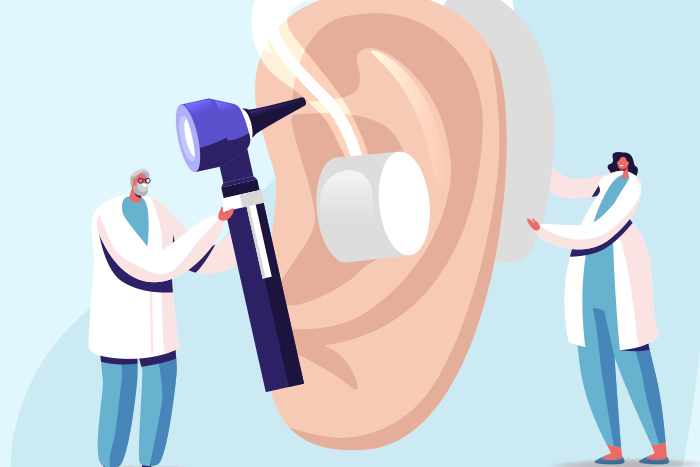Understanding the Impact of Hearing Loss
Many people think of hearing loss as just an inconvenience—something that makes conversations harder or the TV volume a little louder. But did you know that hearing loss is connected to brain health, mental well-being, and even your risk of falling? Research shows that untreated hearing loss can contribute to memory problems, depression, and balance issues, making it much more than just a hearing issue.
Taking steps to address hearing loss early can help protect your brain and overall health, keeping you sharp, engaged, and independent.
The Connection Between Hearing Loss and Brain Health
Hearing and brain function are closely linked. When hearing declines, the brain has to work harder to understand sounds, which can take resources away from other important functions like memory and concentration. Studies have found that people with untreated hearing loss are more likely to develop cognitive issues, including dementia.
What are cognitive issues?
Cognitive issues refer to difficulties with thinking, memory, and problem-solving. These challenges can range from mild forgetfulness to more severe impairment that interferes with daily life.
Dementia is a more serious cognitive condition that affects memory, reasoning, and the ability to carry out everyday activities. Alzheimer’s disease is the most common type of dementia, but there are other forms as well. Hearing loss has been linked to an increased risk of cognitive decline and dementia.
Hearing Loss and Dementia
Research from Johns Hopkins University found that mild hearing loss doubles the risk of dementia, while moderate hearing loss triples the risk. For those with severe hearing loss, the risk is five times higher. Scientists believe this happens because the brain receives less stimulation when hearing is impaired, leading to faster cognitive decline. Additionally, struggling to hear can cause social isolation, which is another risk factor for dementia.
Hearing Loss and Mental Health
Hearing loss doesn’t just affect your brain—it also impacts your emotional well-being. Many seniors with hearing loss experience frustration, loneliness, and even depression. [Link to
Increased Risk of Depression
According to the National Council on Aging, older adults with untreated hearing loss are more likely to report feelings of sadness, anxiety, and social withdrawal. Conversations become more challenging, leading many people to avoid social situations altogether. This isolation can increase the risk of depression and lower the overall quality of life.
Stress and Fatigue
Straining to hear throughout the day can also lead to increased stress and fatigue. The extra effort required to understand speech can be mentally exhausting, leaving you feeling drained and overwhelmed. Fatigue refers to extreme tiredness or a lack of energy, which can affect concentration, mood, and overall well-being.
Hearing Loss and Balance Issues
Your ears play an essential role in keeping you balanced. The inner ear is directly connected to your body's ability to sense movement and maintain stability. When hearing loss occurs, it can interfere with these balance signals, increasing the risk of falls.
Increased Fall Risk
A study from Johns Hopkins found that even mild hearing loss can triple the risk of falling. Researchers believe this happens because the brain has to work harder to compensate for hearing loss, leaving fewer resources available to focus on balance. Falls are a leading cause of injury among seniors, so addressing hearing loss is an important step in staying safe and independent.
How Hearing Aids Can Help Keep Your Brain Sharp
The good news is that treating hearing loss can help protect your brain and overall health. Hearing aids don’t just improve hearing—they also help keep the brain engaged and active.
Cognitive Benefits
Using hearing aids has been linked to a lower risk of cognitive decline. By improving hearing, these devices allow the brain to process sounds more easily, reducing strain and keeping cognitive functions sharp. Harvard Health reports that hearing aids can help slow memory loss and improve mental clarity.
Improved Social Connections
Wearing hearing aids can also help you stay socially engaged. Clearer conversations mean fewer misunderstandings, more confidence, and a greater willingness to participate in activities. Social interaction is key to maintaining mental health and reducing the risk of depression and dementia.
Better Balance and Safety
Because hearing aids improve sound awareness, they can also help with balance and spatial awareness, reducing the risk of falls. Many modern hearing aids come with features designed to help users detect their surroundings more effectively.
Talk to a Doctor Early
If you, family members, or friends have noticed changes in your hearing, it’s important to talk to your doctor as soon as possible. Early intervention can make a big difference in maintaining your brain health and overall well-being. A simple hearing test can help determine if you need hearing aids or other treatments to improve your quality of life.
Steps to Take If You Have Trouble Hearing
If you're experiencing hearing loss, taking action now can help protect your brain, improve your quality of life, and keep you connected to the world around you. Here are some simple steps to get started:
Schedule a Hearing Test: An audiologist or hearing specialist can assess your hearing and recommend solutions.
Try Hearing Aids If Needed: Modern hearing aids are small, comfortable, and highly effective at improving sound clarity.
Stay Socially Active: Engage with friends and family to keep your mind and emotions strong.
Protect Your Hearing: Reduce exposure to loud noises and use ear protection when needed.
Take Control of Your Hearing Health
Hearing loss affects more than just your ears—it impacts your brain, mental health, and physical safety. The good news is that you can take action to protect yourself. Addressing hearing loss early can help prevent memory problems, reduce the risk of depression, and improve balance. By using hearing aids and staying engaged, you can continue to enjoy an active and fulfilling life.
Sources:
Harvard Health: Turning up the volume on brain health
Johns Hopkins Medicine: The Hidden Risks of Hearing Loss
National Council on Aging: Can Hearing Loss Affect Mental Health in Older Adults?

